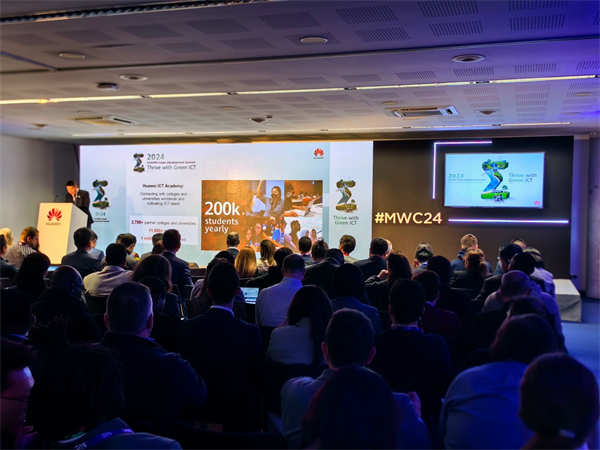
- Home
- Media Center
-
Events
- Wuzhen Summit
- Regional Forums
- Practice Cases of Jointly Building a Community with a Shared Future in Cyberspace
- World Internet Conference Awards for Pioneering Science and Technology
- The Light of Internet Expo
- Straight to Wuzhen Competition
- Global Youth Leadership Program
- WIC Distinguished Contribution Award
- Membership
- Research & Cooperation
- Digital Academy
-
Reports
- Collection of cases on Jointly Building a Community with a Shared Future in Cyberspace
- Collection of Shortlisted Achievements of World Internet Conference Awards for Pioneering Science and Technology
- Reports on Artificial Intelligence
- Reports on Cross — Border Ecommerce
- Reports on Data
- Outcomes of Think Tank Cooperation Program
- Series on Sovereignty in Cyberspace Theory and Practice
- Other Achievements
- About WIC
- 中文 | EN

Huawei stresses commitment to green development

Delegates attend the Huawei Green Development Summit on Feb 27 during the 2024 Mobile World Congress in Barcelona, Spain. [Photo provided to China Daily]
Huawei Technologies Co Ltd said that it is committed to using technology to drive the sustainable and inclusive development of human society.
The remarks were made on Tuesday at a side event during the 2024 Mobile World Congress, or MWC, in Barcelona, Spain. Hosted by Huawei, the event centered on how the company and its industry partners use green information and communications technologies to support low-carbon urban development, nature reserves, bridge the digital divide, and more.
"As a technology company, Huawei is committed to using technology to make the world a better place," said Zhou Jun, president of ICT marketing at Huawei.
Zhou specifically mentioned Huawei's TECH4ALL digital inclusion initiative. Launched in 2019, the action plan, in collaboration with various international organizations, has enabled diverse projects to improve education, health, environment, and development.
For example, the TECH4ALL program and the International Union for Conservation of Nature, or IUCN, a non-profit organization headquartered in Switzerland, co-created the Tech4Nature partnership in 2020, which guides protected areas worldwide on the appropriate use of technology and supports them with digital solutions.
Pilot projects have been conducted in China, Mauritius, Mexico, Spain, and Switzerland at the first phase of the Tech4Nature.
In Spain, for instance, a system composed of cameras, GPS receivers, and a cloud platform, was deployed to help protect the Bonelli's eagle, a species whose population is in decline primarily due to human activities.
The solution was co-developed by Huawei and the University of Girona, an institution based in Girona, Spain.
In a natural park located in Barcelona, where the raptor inhabits, the system has been used to monitor the eagle's movements and detect potential threats to its reproductive success. Data collected from the system can contribute to assisting park management and informing conservation strategies.
"The ICT services of Huawei have been really instrumental in working with particular sites in the five countries and it has been really useful for us," said Susanne Pedersen, director of the Science and Data Centre at IUCN.
With only six years remaining to reach the global biodiversity targets by 2030 under the Kunming-Montreal Global Biodiversity Framework, James McBreen, a senior program officer at the IUCN Centre for Conservation Action, emphasized the urgency to accelerate conservation actions and successes. "The only way we can do that is through effective collaboration."
Last October, the second phase of the Tech4Nature partnership was launched, aiming to pilot projects in six countries, including China, Brazil, Kenya, Turkey, Spain and Mexico.
Huawei also worked with the United Nations Educational, Scientific and Cultural Organization, or UNESCO, to empower schools in Egypt, Ethiopia, and Ghana that lack digital resources, and transform them into technology-enabled open schools, Zhou said.
Through the UNESCO-Huawei "Technology-enabled Open Schools for All", which began in 2020 and will run until 2024, the chosen pilot schools received assistance in digital skills training, access to ICT devices, online learning platforms establishment, remote learning resources development, and more.
More than 966,250 students and educators have benefited from the project, according to a press release by UNESCO.
"We firmly believe that digital technology is a key enable for green and low-carbon urban development and environmental protection. As we usher in an intelligent world, Huawei will continue working with global partners on the adoption of green ICT technologies…Let us build a fully connected, intelligent world together," Zhou said.

The World Internet Conference (WIC) was established as an international organization on July 12, 2022, headquartered in Beijing, China. It was jointly initiated by Global System for Mobile Communication Association (GSMA), National Computer Network Emergency Response Technical Team/Coordination Center of China (CNCERT), China Internet Network Information Center (CNNIC), Alibaba Group, Tencent, and Zhijiang Lab.





